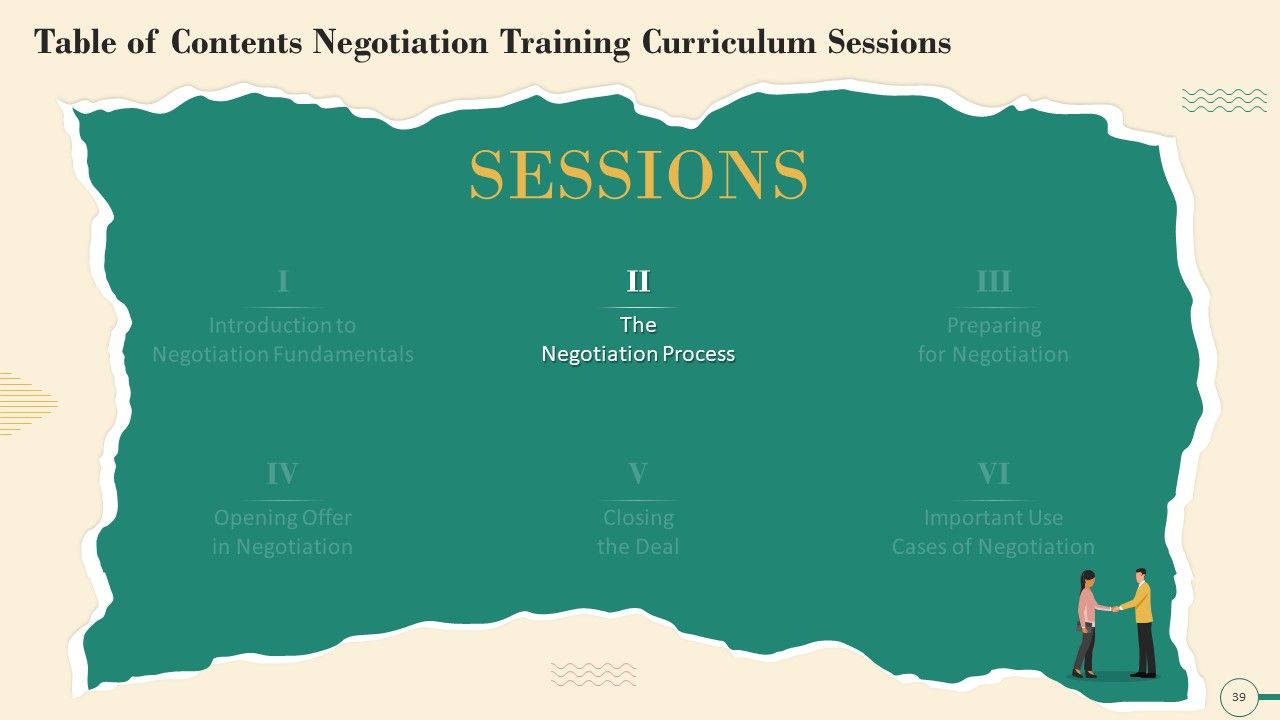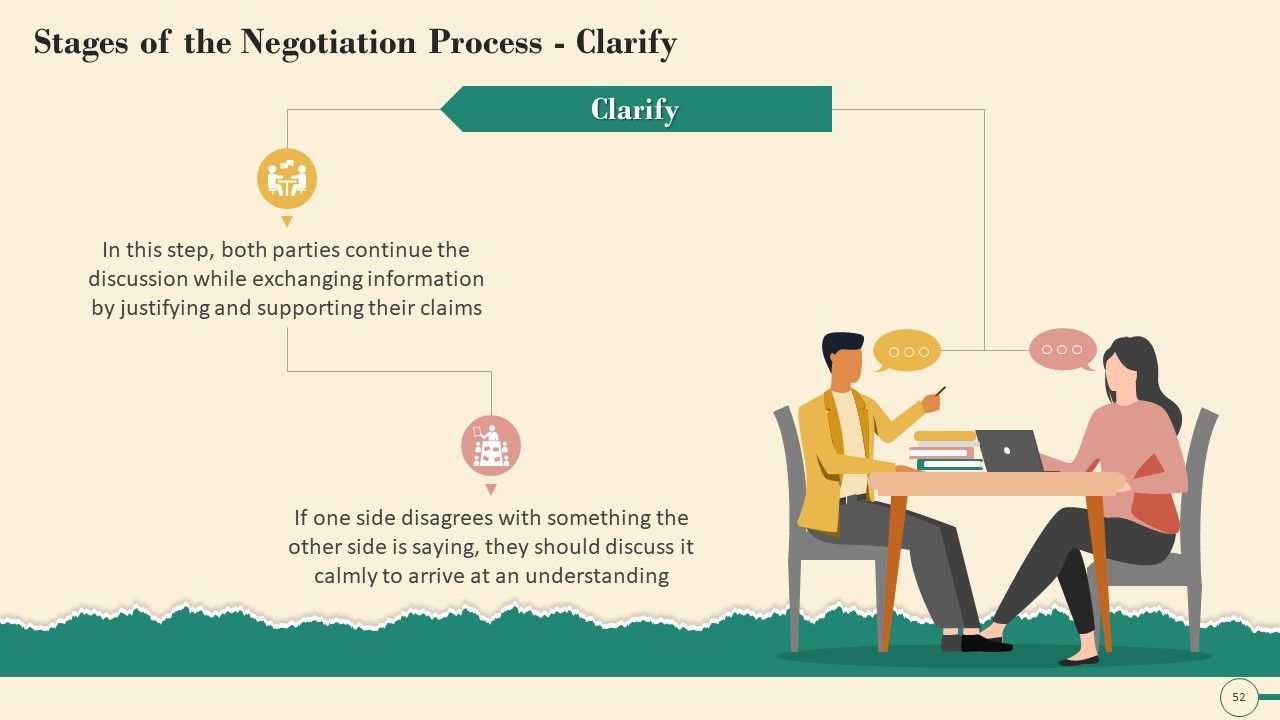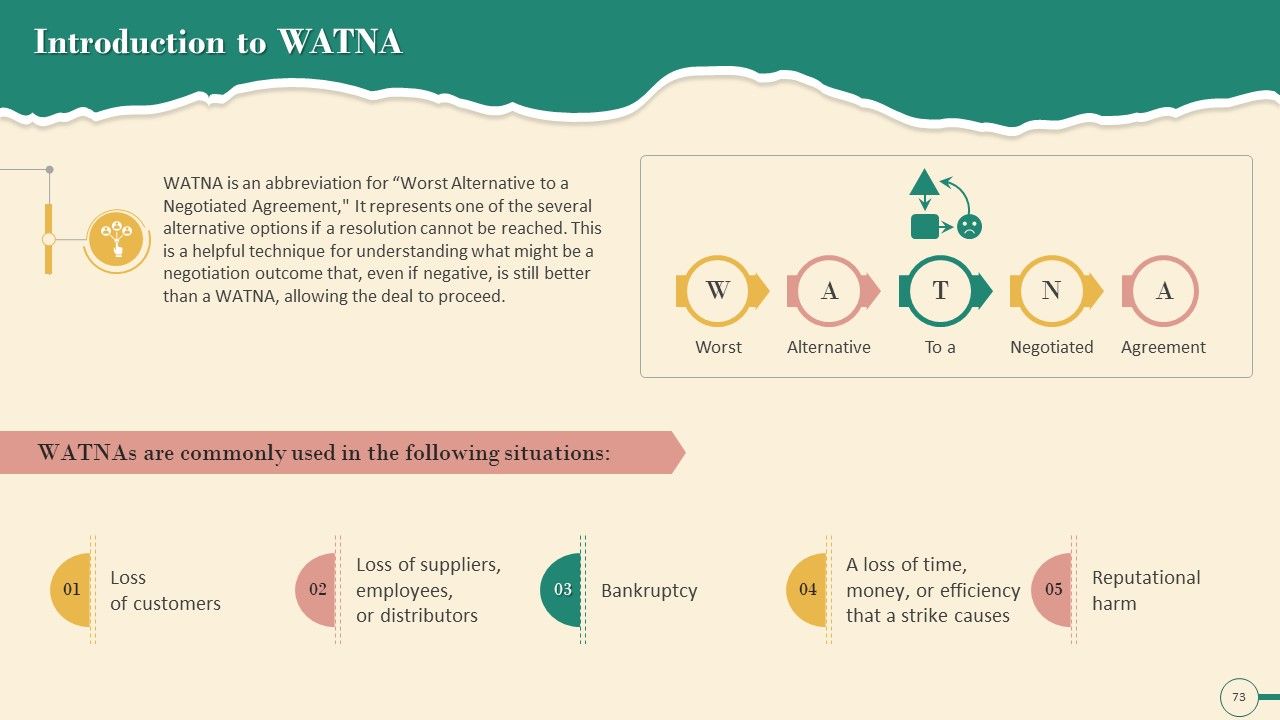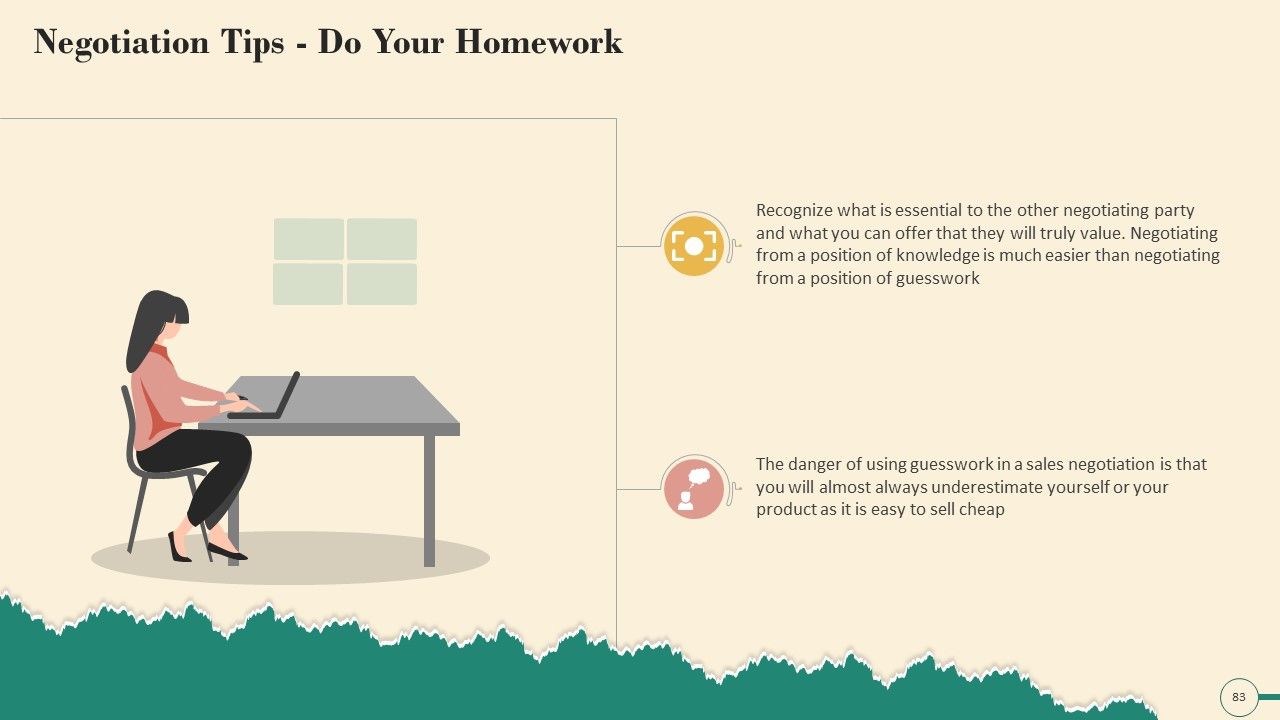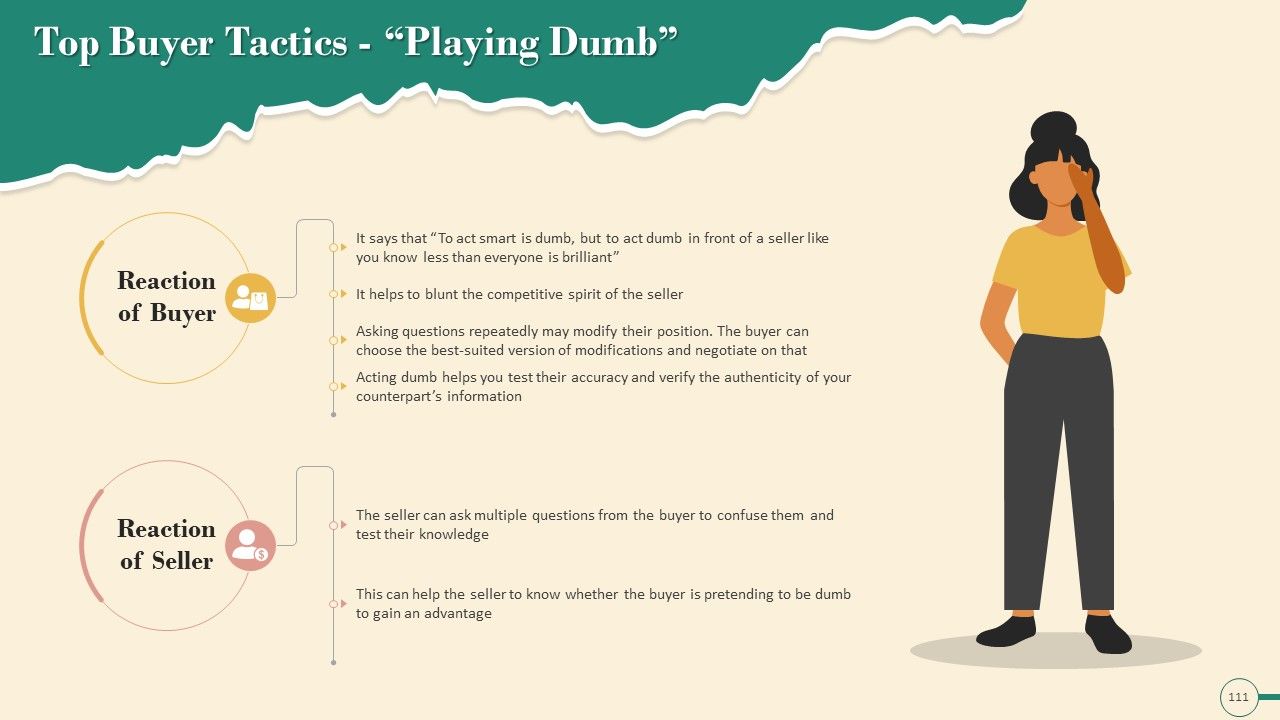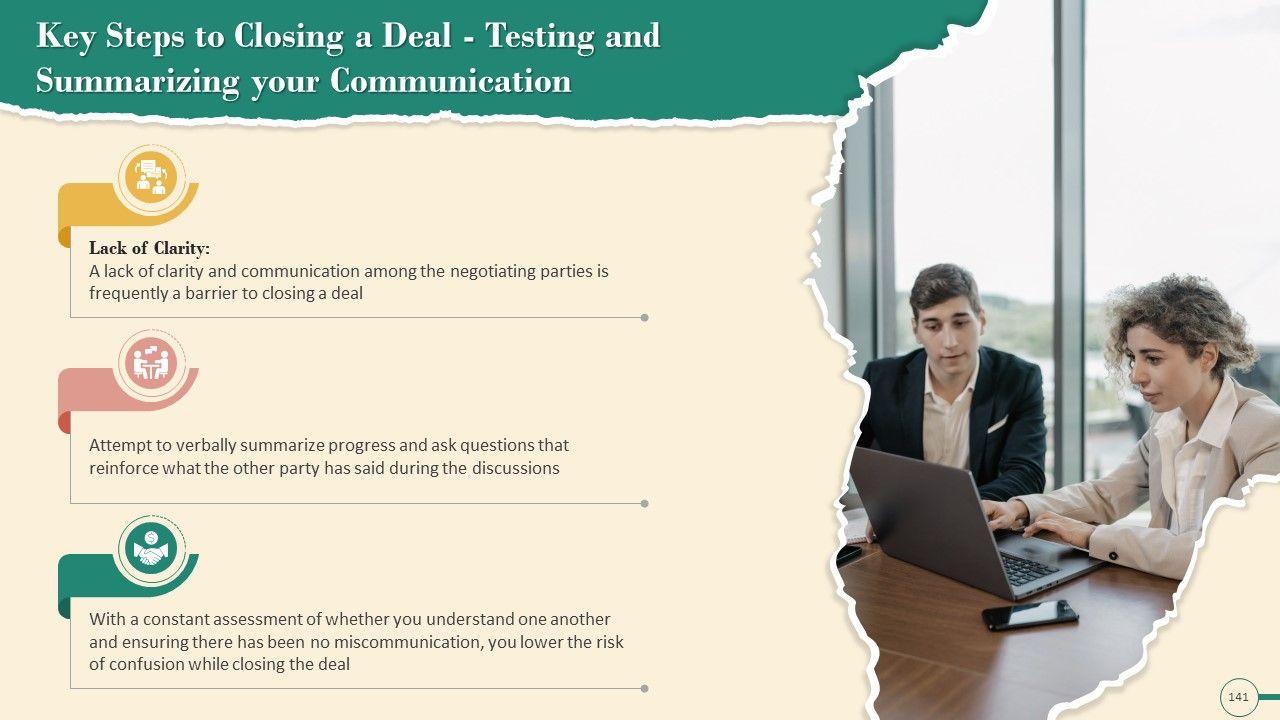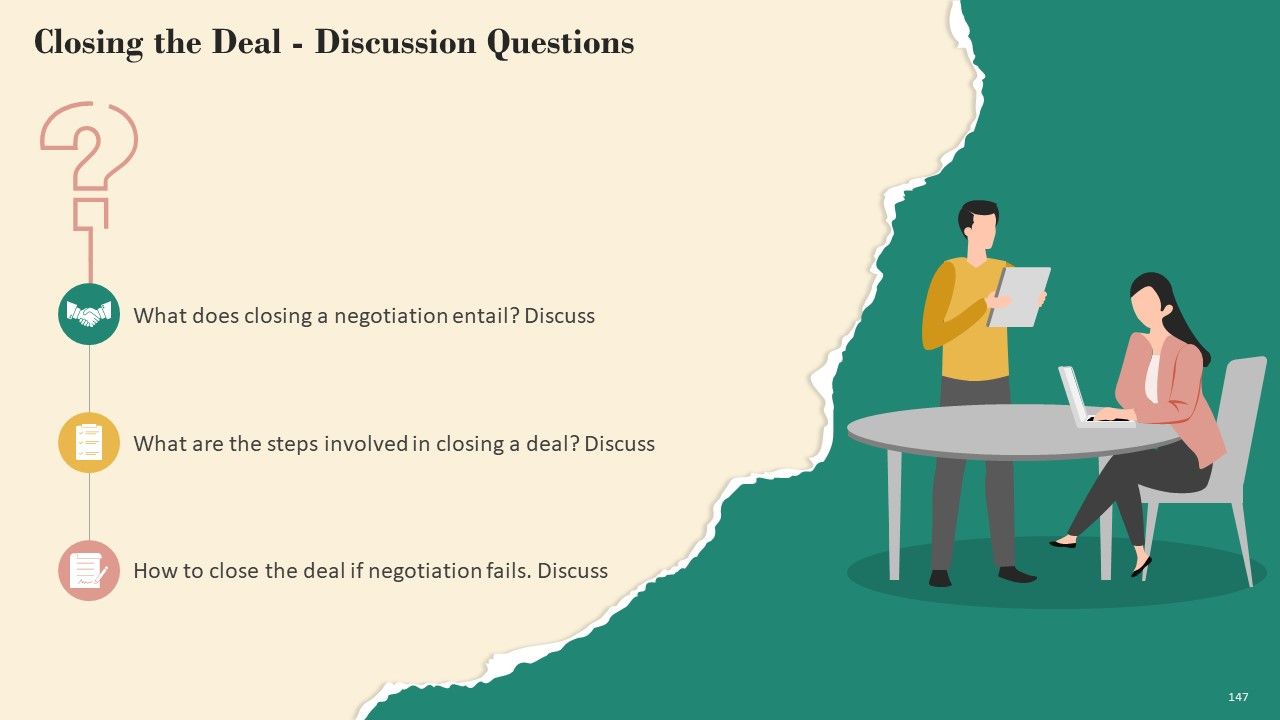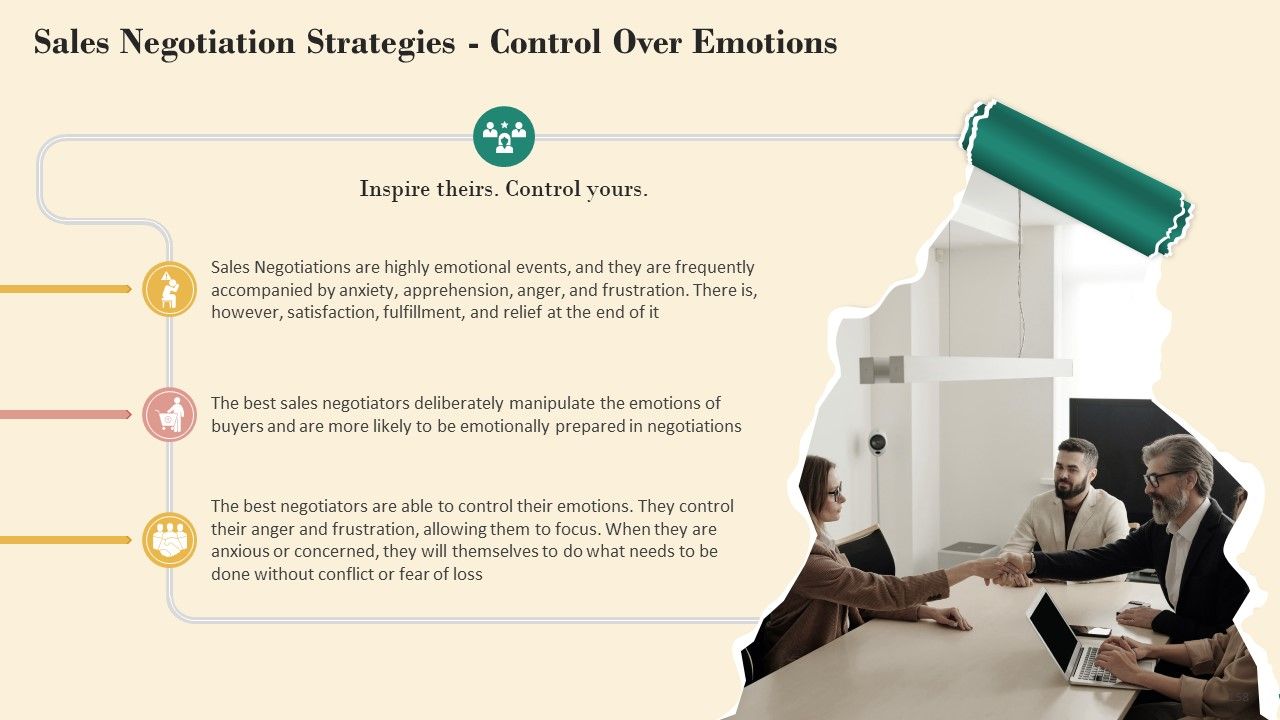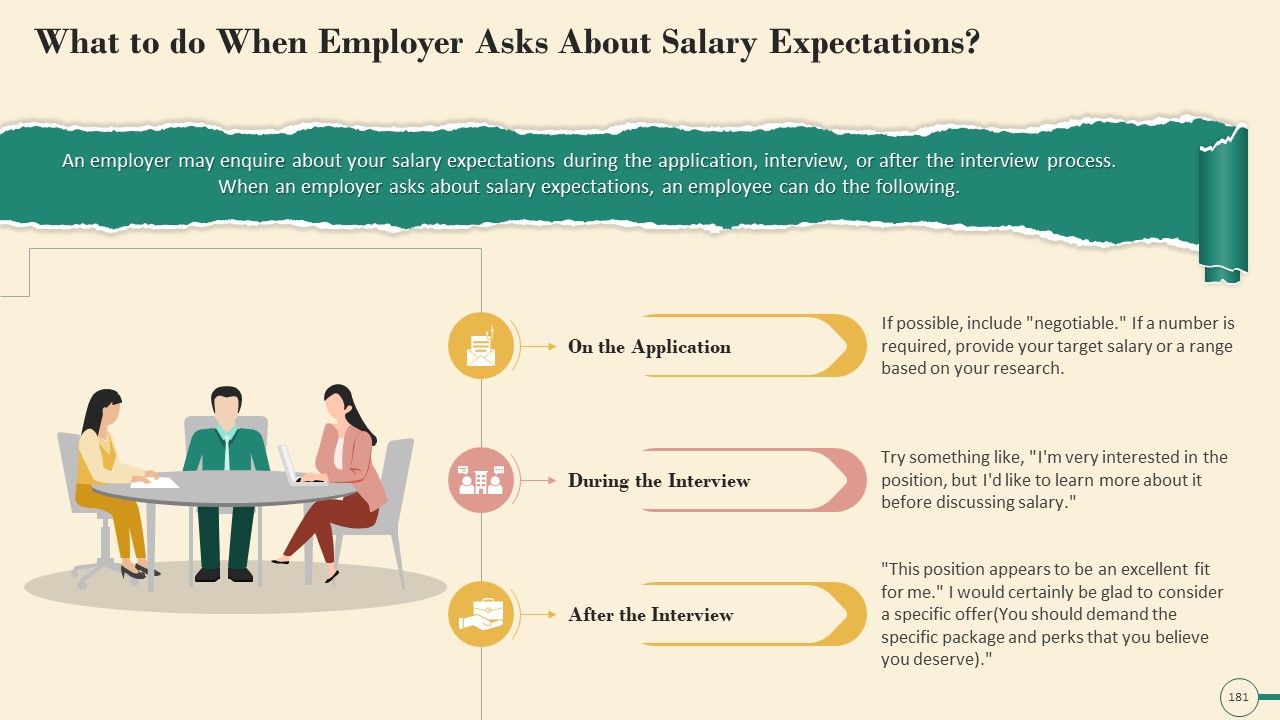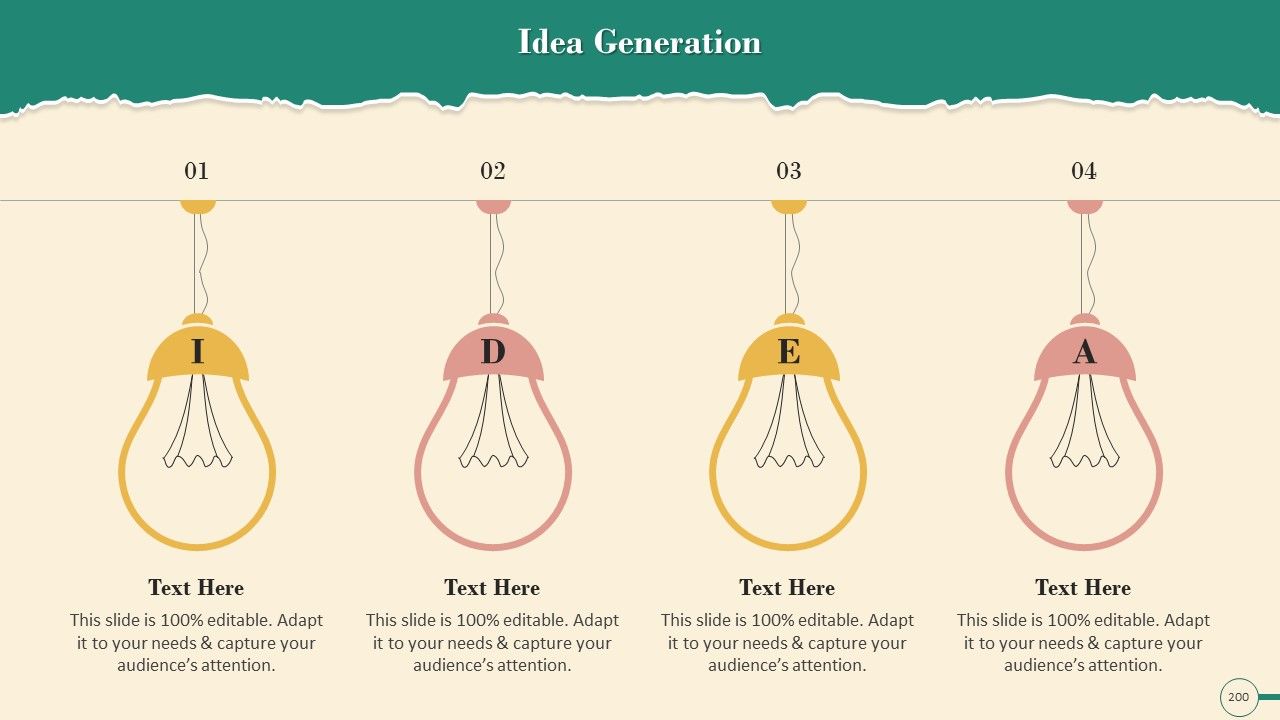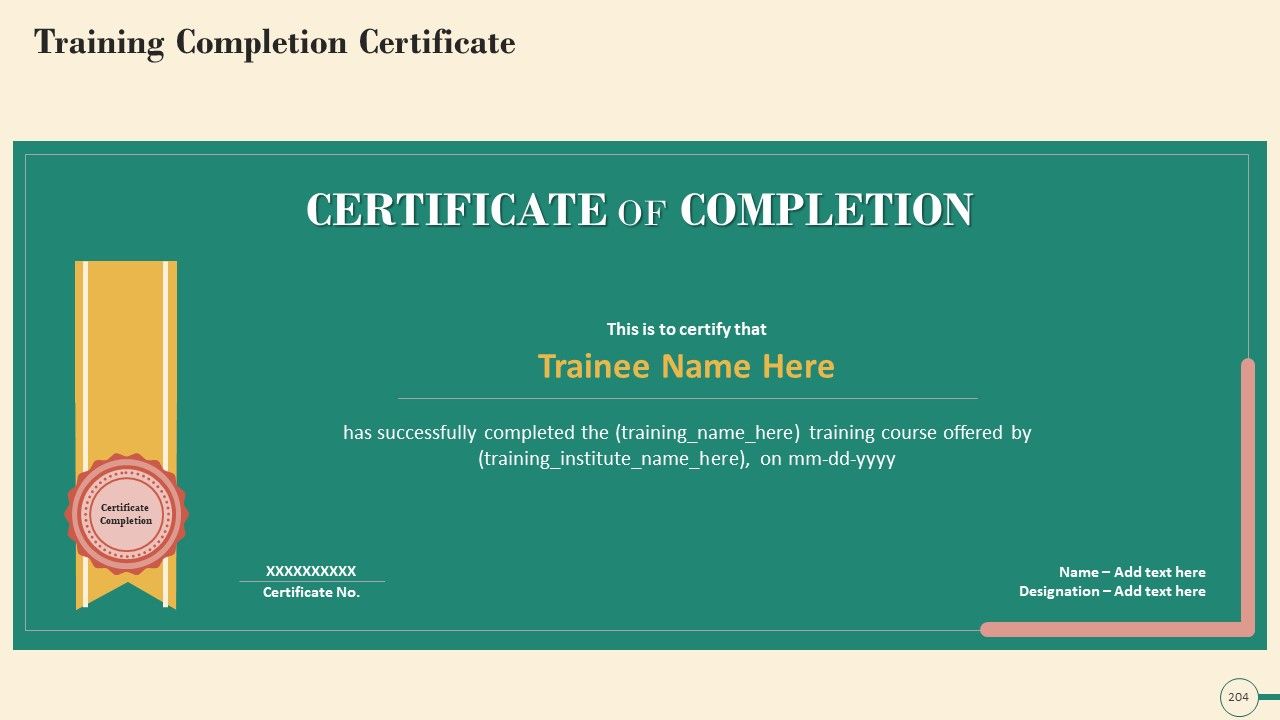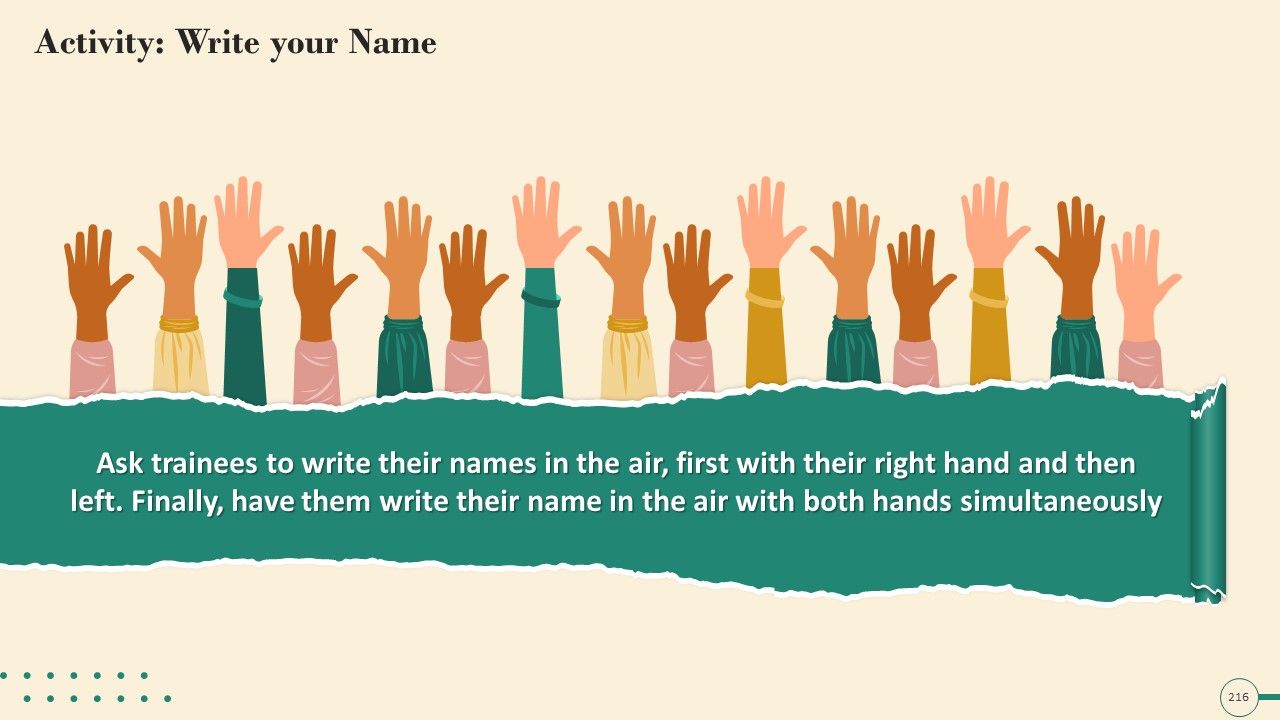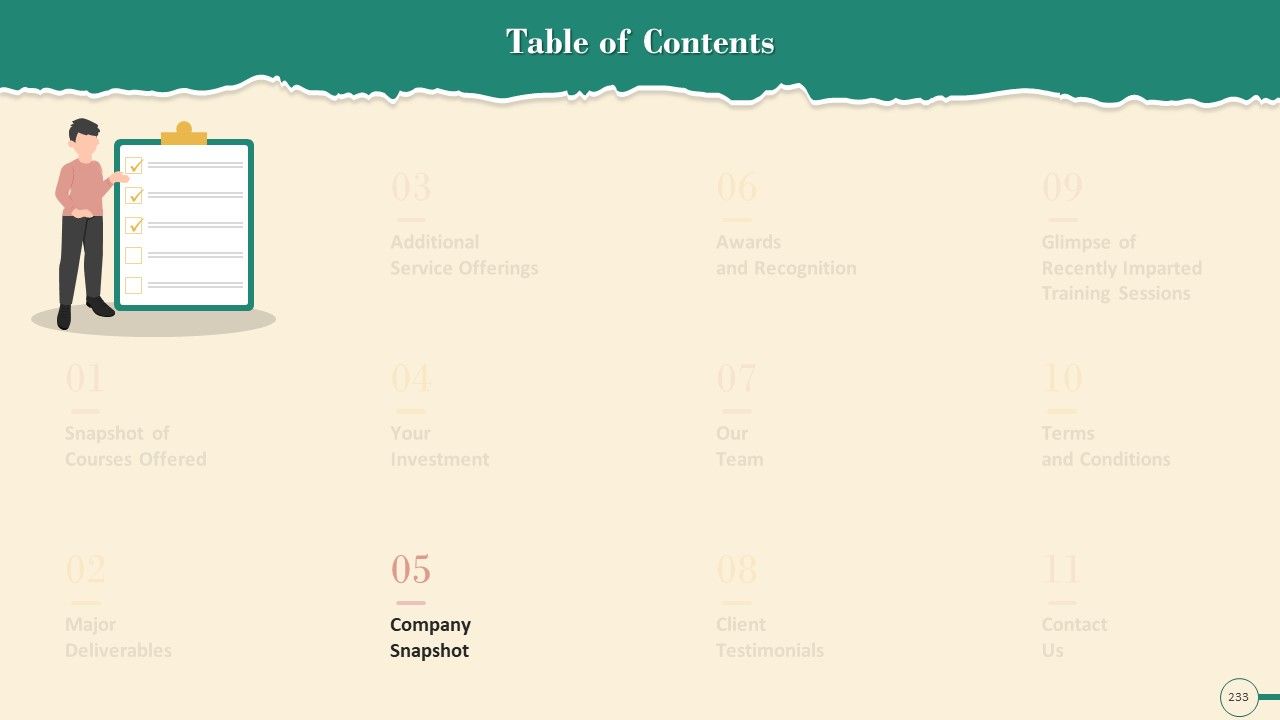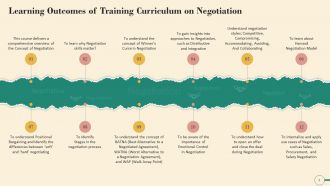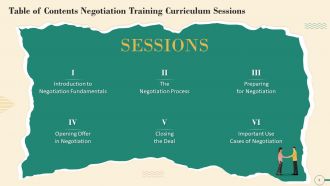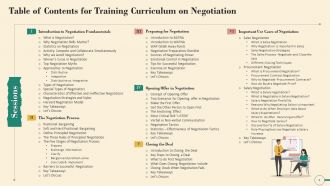Comprehensive Training Curriculum on Negotiation Training PPT
What is it
- EduDecks are professionally-created comprehensive decks that provide complete coverage of the subject under discussion
- These are also innovatively-designed for a powerful learning experience and maximum retention
Who is it for?
- EduDecks are for Trainers who want to add punch and flair to program and leave a lasting impact on their trainees
- They are also for Teachers who want to win over their students with content as well design
Why EduDecks?
- EduDecks provide an A-Z coverage of courses on any topic and covers it in both great depth and wide scope
- These slides are also professionally-designed to deliver a punch to your programs
Claim extra savings by utilizing this 5% off coupon code.
Copy and paste it at the checkout page to receive a huge
discount on your purchase. Hurry, redeem it now!
Copy the code
Why Corporate Trainers love us?
- Content created by Industry experts, active in their fields
- Relevant concepts supplemented with industry case studies
- Visually appealing slides with 100% accurate & relevant data
Why Teachers love us?
- Comprehensive curriculum covering all aspects of the topic
- Relevant examples provided with the topics
- Just download and amaze your audience without making any content changes
What you will get
- 06 Structured Sessions
- 200+ Professionally Designed Slides
- 20+ Thought Provoking Discussion Questions
- Activities, Case Studies and Key Takeaways
People who downloaded this PowerPoint presentation also viewed the following :
- All Decks , All Modules , All Courses , Edu Tech , Negotiation , Negotiation , Negotiation
Create an Immersive Training Experience
Created by Subject Matter Experts
Professionally Designed Slides
Structured Sessions
Comprehensive Curriculum
Detailed Teaching Notes
Real-Life Case Studies
Assessment Questions
Client Proposal
Complete Curriculum
- What is Negotiation?
- Why Negotiation Skills Matter?
- Statistics on Negotiation
- Activity: Compete and Collaborate Simultaneously
- Why we Avoid Negotiation?
- Winner’s Curse in Negotiation
- Top Negotiation Myths
- Approaches to Negotiation
- Distributive
- Integrative
- Distributive vs. Integrative
- Types of Negotiation
- Assertive
- Analyst
- Accommodator
- Special Types of Negotiators
- Identify the Qualities of Successful and Unsuccessful Negotiators
- Negotiation Strategies
- Win-Lose
- Win-Win
- Lose-Lose
- Lose-Win
- Negotiation Styles
- Competitive
- Compromising
- Accommodating
- Avoiding
- Collaborating
- Harvard Negotiation Model
- Key Takeaways
- Let’s Discuss
- Positional Bargaining
- Identify the differences between ‘Soft’ and ‘Hard’ Negotiating
- Principled Negotiation
- Identify the Stages in the Negotiation Process
- Prepare
- Information Exchange
- Clarify
- Bargain and Problem-solve
- Conclude and Implement
- Barriers to Successful Negotiation
- Negative Outlook Towards the Negotiation Process
- Try to Win at All Costs Attitude
- Strong Emotions
- Lack of Empathy
- Wrong Focus
- Blame Game
- Key Takeaways
- Let’s Discuss
- Introduction to BATNA (Best Alternative to a Negotiation Agreement)
- WATNA (Worst Alternative to a Negotiation Agreement)
- WAP (Walk Away Point)
- Negotiation Preparation Checklist
- Sources of Negotiating Power
- Emotional Control in Negotiation
- Tips for Successful Negotiation
- Do your Homework
- Practice Before the Negotiation
- Spend Time Listening & Questioning
- Find the Right Balance of Information Sharing & Withholding
- Be Self-aware
- Develop Your Persuasion Skills
- Build Trust and Respect
- Exercise on Negotiation
- Key Takeaways
- Let’s Discuss
- Concept of Opening Offer
- Two Scenarios for Opening Offer in Negotiation
- Make the First Offer
- Get the Other Person to Open First
- The Anchoring Effect
- Most Critical Skill ‘LISTEN’
- Verbal vs. Non-verbal Communication
- Negotiation Tactics
- Buyer Tactics:
- Not Good Enough
- Knocking the Product
- The Bogey
- Playing Dumb
- Lowballing
- Reluctant Buyer/Seller
- Seller Tactics:
- High-Balling
- The Salami
- Deadline
- Common Tactics:
- Silence
- High Authority
- Playing the Ego
- Closed Questions
- The Trial Balloon
- If You Were in My Shoes
- Surprise
- Buyer Tactics:
- Statistics- Effectiveness of Negotiation Tactics
- Key Takeaways
- Let’s Discuss
- Introduction to Closing the Deal
- Key Steps to Closing a Deal
- Creating a Deadline
- Setting Limits
- Finding Common Ground
- Brainstorming Creative Solutions
- Testing and Summarizing your Communication
- What to do Post Negotiation
- What Does Closing Negotiation Includes
- Closing Deals When Negotiation Fails
- Key Takeaways
- Let’s Discuss
- Sales Negotiation
- What is Sales Negotiation
- Why Negotiation is Important in Sales
- Sales Negotiation Strategies
- The Sales Process - Negotiate and Close the Sale
- Different Closing Techniques
- Procurement Negotiation
- What is Procurement Negotiation?
- Procurement Contract Negotiation
- Why to Negotiate Procurement Contracts?
- How do Buyers Negotiate Price?
- Salary Negotiation
- What is Salary Negotiation?
- What is Negotiable in Salary Negotiation?
- Salary Negotiation Flexibility
- Reasons Why Negotiating Salary is Important
- What to do When Employer asks About Salary Expectations?
- What to do after Receiving an Offer?
- How to Negotiate Salary?
- Dos and Don’ts of Salary Negotiation
- Role-playing Exercise: Negotiate a Salary Increase
- Key Takeaways
- Let’s Discuss
Sample Instructor Notes
What is this slide for: Most Common Reasons People Avoid Negotiation
This slide covers: This slide illustrates common reasons people avoid Negotiation. The reasons are embarrassment and pride, inability to think beyond binary choice of YES or NO, fear of losing the deal, being liked, and fear of negotiating badly.
Instructor’s Notes:
The most common reasons why people avoid negotiation are as follows:
- Embarrassment and Pride: People are easily embarrassed when they consider negotiating, but they should not be
- Inability to Think Beyond Binary Choice of YES or NO: People must realize that there is always a choice beyond reluctantly saying YES or unhelpfully saying NO. People should never forget that there is always the option of Negotiating and creating a win-win deal for all parties involved
- Fear of Losing the Deal: People believe that attempting to negotiate will result in a complete loss of the deal. Hence, they abstain from Negotiating
- Being Disliked: Many people are afraid that if they negotiate, others will dislike them. But whether they like you or not, you're not going to see them again. Even if you pay the full amount, there is no guarantee that they will like you
- Fear of doing a Bad Job at Negotiating: This is the fear that engulfs all of us. Many people believe that their negotiating skills are inadequate, so why even try? However, the ability to negotiate never arises because they never ask. If you never ask, you will never be able to negotiate
What is this slide for: Matrix representing Negotiation Strategies
This slide covers: This slide illustrates the Negotiation Strategy Matrix. The parameters of the matrix are Win-Lose, Win-Win, Lose-Lose, and Lose-Win.
Instructor’s Notes:
- Lose-Win: Lose-Win situations are frequently the result of a lack of courage to pursue one's own goals while caving to the other party's desires. Playing for a short-term loss can be used as part of a long-term strategy on occasionally
- Lose-Lose: Typically, Lose-Lose scenarios result from focusing on the wrong goals or broken relationships
- Win-Lose: The strategy in Win-Lose is to meet your objectives, even at the expense of the other party's objectives. As a result, we compete with our ‘opponent’ for the most significant value share
- Win-Win: With Win-Win, we achieve our goals by assisting the other party in achieving their goals or collaborating with our ‘partner’ to maximize value creation
What is this slide for: Three Rules of Principled Negotiation
This slide covers: This slide depicts the rules of principled negotiation. The three rules are: Separate the person from the problem, focus on interests, not positions, and generate options for mutual gain.
Instructor’s Notes:
The rules of principled negotiation are as follows:
- Separate the Person from the Problem: It is possible to be gentle with the people you work with while being tough on the problem. One can act in ways that are respectful of the other and treat the other person well. This can be done even as you work hard on addressing the substantive issues that led to the negotiation in the first place
- Focus on Interests, not Positions: Creative solutions can be accomplished by focusing on the parties' mutually shared interests. Positions are statements about what someone wants or needs from a situation, whereas interest is the underlying reason or motivation for the position
- Invent Options for Mutual Gain: It is critical to generate multiple options that may satisfy the interests of both parties. Brainstorming techniques, for example, can be used to create multiple options from which a resolution can be developed later
FAQs
We provide training decks on a wide variety of business and technical topics such as Diversity & Inclusion, Customer Service, Search Engine Optimization, Blockchain Technology, and many more. These are ready-to-present decks that can be downloaded and presented in their current form. These decks are carefully created by industry experts, designed by professionals to deliver a power packed training session.
We want our training decks to evoke curiosity and inspire passion for learning. Each training deck consists of multiple sessions with impeccably designed slides to explain concepts in-depth, key takeaways to summarize sessions, discussions, and multiple-choice questions to assess trainees’ learning. The deck also contains activities and memes to break the monotony and make the training more interactive. Each training deck comes with an assessment form and editable proposal to help pitch your training to clients with success.
It depends on the trainer's content delivery pace, but each deck is created to ensure that training content is for a minimum of 16 hours.
Yes. A significant segment of our customers are professional mentors, coaches and teachers. You can create presentations with our content and distribute these to your trainees. The only caveat is that you cannot share your subscription to our content with others; the license is not transferable. Also, you cannot resell SlideTeam content to others.
Each slide is 100% editable in PowerPoint. Every element of the slide – text, icons, images, vectors, color scheme, etc. can be modified to build an effective PowerPoint presentation. Simply DOWNLOAD, EDIT, and PRESENT!
All PPT slides are compatible with PowerPoint 2007 and above. Some diagrams will not show up correctly with older versions of PowerPoint, like PowerPoint 2003 or lower, because of rendering issues. Yes, they work with PowerPoint for MAC, and decks are compatible with Google Slides too.
Absolutely yes! Our decks are yours to keep and build upon even after your subscription expires. You will not be able to download any additional decks once your subscription expires, but the ones you've downloaded are yours to keep forever.
Our entire website is HTTPS secure, and our payment system is managed by PayPal and Stripe, two of the world's leaders in credit card payment systems and very respected companies in online payments. This makes our systems 100% secure. We do not store or have access to any credit card information ourselves. We direct you to these third-party secure sites with 100% secure SSL connections where you can safely purchase a subscription and then direct you back to our site to download products.
You are allowed to log in and download content from 3 computers. Our website keeps track of login IP addresses, MAC Address Usage, and Browser and Computer Operating System fingerprinting, and you will not be able to log in from more than three computers.

3 Item(s)
-
by Marigold vivian Mingle
4.7/5100%The ppt is put together in a way and manner I wanted
-
by Alexander Ramirez
4.7/580%Excellent products for quick understanding.
-
by Darwin Mendez
4.7/5100%The quality of the templates is as fine as it could get. It was a purchase well made!
3 Item(s)








































